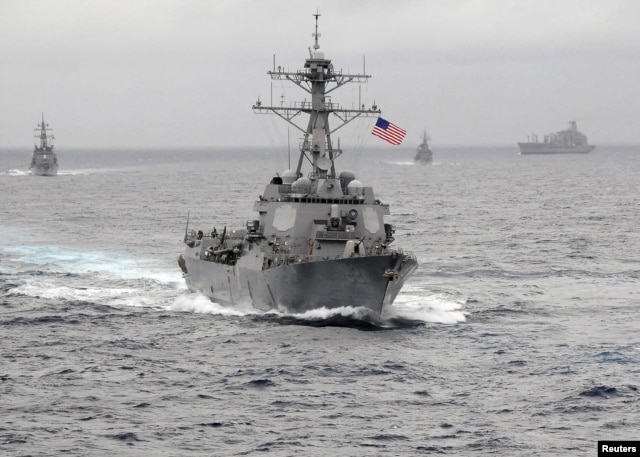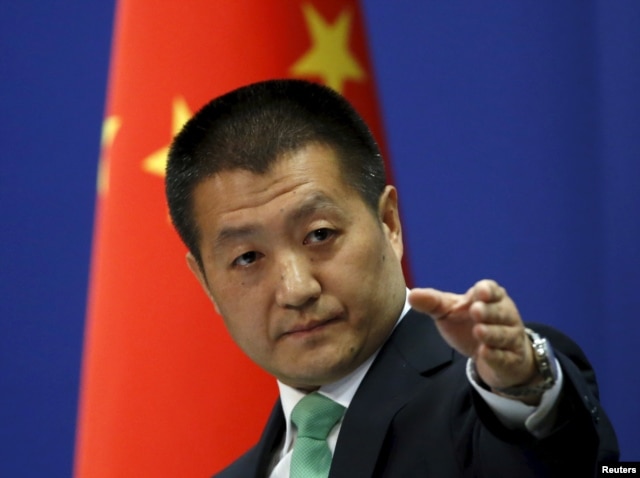By Thomas Duffy ,
China lashed out at the United States for sending a warship near disputed South China Sea islets and reefs claimed by Beijing, while Washington promised to conduct more such patrol missions.Beijing's foreign ministry said Wednesday it summoned U.S. Ambassador Max Baucus to deliver a formal protest over the Tuesday incident, which represents the U.S.' boldest challenge yet to China's controversial territorial claims.
"This action by the United States threatens China's sovereignty and security interests and endangers the safety of personnel and facilities on the reef, which is a serious provocation" said Vice Foreign Minister Zhang Yesui.
An editorial in the Communist Party-run Global Times said the U.S. patrol mission amounted to "harassment," and urged the Chinese government to take steps to show the U.S. it is "not frightened to fight a war with the U.S."
"We should first track the U.S. warships. If they, instead of passing by, stop for further actions, it is necessary for us to launch electronic interventions, and even sound out warships, lock them by fire-control radar and fly over the U.S. vessels," said the paper, whose opinions generally reflect the views of the government.
A U.S. Defense official said Tuesday it is likely the U.S. Navy will make more patrols in the area. Speaking with VOA, the official, who did not want to be identified, said, "This is not going to be the last one."
He added there were several Chinese vessels operating in the vicinity of the USS Lassen, with one of the vessels clearly "shadowing it" as it passed within 12 nautical miles (22 kilometers) of a small reef that China has been expanding into a larger island through large-scale dredging operations.
"All maneuvers by Chinese vessels and aircraft were safe and professional," according to the official, who spoke to VOA on the condition of anonymity. He added it is "quite typical" for a Chinese vessel to shadow a U.S. vessel when its operating in the South China Sea. "It is not out of the ordinary," the official said.
‘Freedom of navigation’
Military officials in Washington said the approach to the Chinese-held Subi reef was a "freedom of navigation" exercise that is not related to questions of sovereignty over areas that also are claimed by Vietnam and the Philippines.
In Washington, Senator John McCain, a decorated war hero who served in the Navy and was held prisoner during the Vietnam War, said the U.S. naval maneuver was a long-overdue gesture.
"As China mounts increasingly routine challenges to the freedom of the seas through the Asia-Pacific region," McCain said, "it is more important than ever that the United States fly, sail and operate wherever international law allows. And the South China Sea must be no exception." He called for regular air and naval patrols in the weeks and months ahead to make clear "the U.S. commitment to uphold freedom of the seas."
 |
| The US Navy guided-missile destroyer USS Lassen sails in the Pacific Ocean in a November 2009 photo provided by the U.S. Navy. |
U.S. allies in the region also welcomed the American ship's passage near the disputed Spratly Islands, although in more cautious terms.
In Manila, Philippines President Benigno Aquino said “any movement through this particular body of water should not be hampered by any particular entity.”
Japan said it continues to be concerned about China's activities in disputed territories and waters. “We're closely coordinating our intelligence information with the United States,” Chief Cabinet Secretary Yoshihide Suga said in Tokyo.
Vietnam has not yet commented on the matter. Nguyen Ngoc Truong, a former Vietnamese diplomat and currently chairman of privately-owned Center for Strategic Studies and International Development, said Hanoi has to calculate carefully how to respond so as not to anger its giant northern neighbor China.
“Vietnam’s silence means agreement [with what the US is doing]. Vietnam shared thousands of kilometers of border with China so it has to be careful with its response. It does not want to complicate its relations with China. I think the U.S. understands the stance of Vietnam as well as the latter’s strategic location. It is in a difficult and delicate position, facing huge pressure from China," he said.
American officials indicated weeks ago the Navy would send a ship into the disputed territorial waters. About 200 Chinese troops are believed to be stationed on Subi reef, which is naturally above water only at low tide.
Sheila Smith, senior fellow for Japan studies at the Council on Foreign Relations in Washington, said the U.S. naval activity had been expected. China's reaction, she noted, suggests "that they are not ready to peacefully resolve these disputes but, in fact, their buildup and the presence of Chinese military on these islands suggests that they want a fait accompli. They just simply want to occupy the islands.”
Other claimants to the South China Sea islands cannot compete with China's growing naval and air power, Smith said, adding, “I don't think the United States should stand back," because the Americans have "one of the navies ... that others in the region look to - to set the tone and to lead.” see more





No comments: